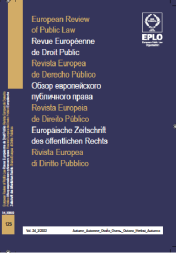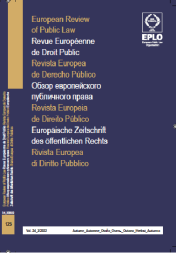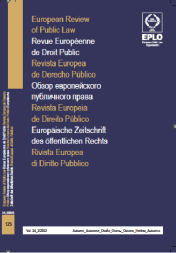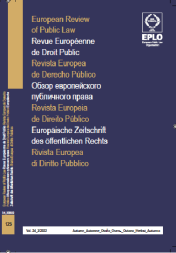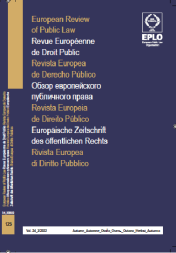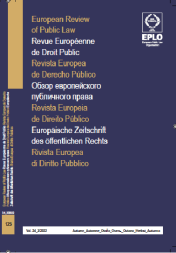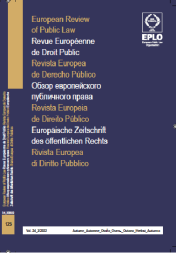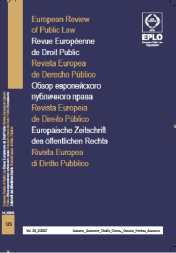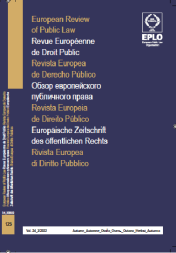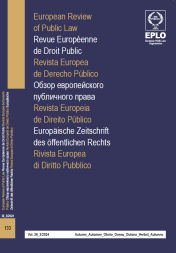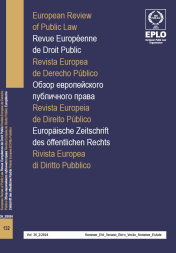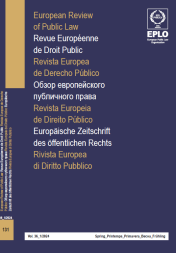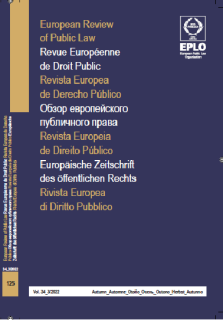
ERPL
Vol. 34, no 3, autumn/automne 2022 (125)
This ERPL issue starts by an article which aims to examine the vital role of the CJEU in establishing not only the ‘content’ of EU law but also how its effectiveness can be attained, choosing as its starting point of enquiry the EU jurisprudence on effectiveness. It sets the theoretical and analytical foundations to critically assess the EU case law on effectiveness, it discusses the complexity and the academic controversy surrounding the EU case law on effectiveness, and, subsequently, it systematizes the EU effectiveness principles and critically reflects on the EU peculiar principles of effectiveness.
The next article aims to study the structure, funding, and campaigning of political parties in Greece, with reference to the respective institutional legal-political context in Europe and the USA. The structure of political parties, namely the three systems of legislative treatment of political parties: substance, formal and mixed; the funding of political parties, namely the regular and the electoral; and the ways of political parties campaigning are analyzed. The article argues that radio and television as a means and a factor in shaping opinion must be separated from the sphere of coordinated state power and that more citizen participation in the political scene and the strengthening of direct democratic institutions are necessary.
The third article is concerned with the secular principle of equality of citizens before public services regardless of their ideological and religious differences and the question of how the administration operates according to the principles of modern public law in states with a formal religion. In a government like Iran where the recognition of Islam affects the general rules of the country, and civil service, the serious question of whether the administration in such a system can carry out its public missions impartially is raised. A study of government regulations and practices in Iran shows that in many areas, such as public services as well as the classic elements of public order, the government operates like a modern, secular administration. There are, however, important differences in areas such as civil service and areas of public culture.
In the section of Chronicles of Constitutional Law, the chronicle coming from Austria deals with the entry into force of the 15th Additional Protocol to the ECHR, which, among other issues, shortened the appeal period from six to four months. In addition, the chronicle also contains a cursory review of the impact of the COVID-19 pandemic on the Austrian constitutional order; the general obligation to vaccinate against COVID-19 was held to be constitutional by the Constitutional Court in view of the temporary absence of administrative penalties. The rest of the Court’s fundamental rights case law caused quite a stir. This included a rare finding on the unconstitutionality of state treaties, as well as innovations in the area of family and parentage law and the financing of public broadcasting.
The chronicle on the Constitutional Law of Russia focuses, on the one hand, on the constitutional reform proposed by the President and adopted by plebiscite, which has further strengthened the presidential power and caused many changes in ordinary laws, especially those on political institutions and the judiciary, and, on the other hand, on the fight of the government against the COVID-19 pandemic. The holding of the parliamentary elections as well as a few important decisions of the European Court of Human Rights are also worthy of notice in this chronicle.
The third chronicle of Constitutional Law, coming from Slovakia, first analyzes a 2022 Constitutional Court decision regarding the use of the legislative fast-track procedure on measures adopted by the parliament in June 2022 regarding the “family package”, and then looks at the 2022 decision of the Constitutional Court on the constitutionality of the referendum on an early election.
In the section of Chronicles of Administrative Law, the first chronicle analyzes various interesting developments experienced by Belgian administrative law in 2021: Mechanisms such as the “motion of constructive mistrust” were adopted and thus local democracy has been strenghtened in the Flemish Region; a law on the “pandemic” was adopted, which contains a comprehensive framework applicable to the COVID-19 pandemic, as well as to possible future epidemic emergencies; with regard to the climate emergency, it is ruled that in pursuing their climate policy, the public authorities are not behaving like normally prudent and diligent authorities; finally, a written procedure is now permitted even outside a pandemic in the Administrative Jurisdiction Section of the Council of State, which may offer to the parties that a case that is ready to be ruled not be called for hearing. The parties to a dispute before the Foreigners’ Litigation Council may also request the use of a fully written procedure.
The second Administrative Law chronicle, coming from Portugal, provides an overview of Decree-Law 36/2022 of 20 May 2022, which was approved to tackle the impacts of the steep increase in prices of materials, labor and support equipment in public contracts. The authors also take the opportunity to take a look into the amendments introduced by Decree-Law 78/2022 of 7 November 2022 to two current key pieces of legislation of Portuguese public procurement.
The chronicle on Jurisprudence, coming from Portugal, gives an overview of the Portuguese Constitutional Court case law of 2021. In this year, the Court issued important rulings on medically assisted death, the distribution of powers between the Parliament and the Government in the definition of criminal offenses during the state of emergency and the state of calamity due to the COVID-19 pandemic, the right to gender self-determination and expression of gender and its consequences within the educational system, the right to examine witnesses and its limitation during the COVID-19 pandemic (videoconferencing) and lastly on the right to property as apposed to rental contracts of public interest. Criminal and Tax Law stood out as the main legal areas approached by the Portuguese Constitutional Court.
The review of an interesting selection of books coming from Austria follows while this ERPL issue concludes with the presentation of two books received by the EPLO Library.
Summary
G. Gentile, One, No one, One Hundred Thousand: The Multi-faceted Effectiveness of EU Law [IN ENGLISH]
M.-E. Ioannou, Political Parties: Structure, Funding and Campaigning [IN ENGLISH]
S.-M. Vaezi, The Administration and the Official Religion Issue - Case Study of Iran [IN FRENCH]
Chronicles
I. Constitutional Law
H. Eberhard / J. Fux, Austria [IN GERMAN]
S. Manzhosov / I. Tretiak / E. Kazmina / S. Maximova / M. Revazov / E. Vas’kova / A. Zezekalo, Russia [IN ENGLISH]
E. Láštic, Slovakia [IN ENGLISH]
II. Administrative Law
D. Renders / P. Abba / A. Volders, Belgium [IN FRENCH]
A. Choon / M. E. Lopes, Portugal [IN ENGLISH]
II. Jurisprudence
A. M. Abrantes / C. Gouveia Alves / N. de Lemos Jorge, Constitutional Jurisprudence, Portugal [IN ENGLISH]
Book Reviews
B. Leitl-Staudinger [IN GERMAN]
Books Received [IN ENGLISH]















